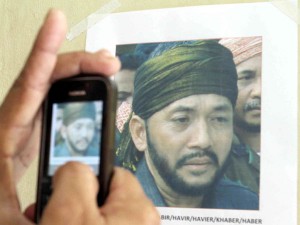Did Malik escape to Sulu?

WANTED A wall poster of Habier Abdul Malik is at the main entrance of the central police station in Zamboanga City. EDWIN BACASMAS
ZAMBOANGA CITY—Where is Habier Malik?
The commander of the Moro rebels who attacked this city
20 days ago remained unaccounted for on Sunday as fighting continued between security forces and remnants of his insurgent band two days after the military declared its mission here accomplished.
There were reports on Saturday that Malik, a trusted lieutenant of Moro National Liberation Front (MNLF) leader Nur Misuari, had been wounded, but the information could not be independently verified.
On Saturday night, the Inquirer received information that Malik had slipped through the military blockade and was already in Kanmindos village in Luuk town, Sulu province, with head and leg wounds.
Article continues after this advertisementBut former Rep. Munir Arbison said it was impossible that Malik was in Luuk. Arbison’s brother Allayon is the mayor of Luuk.
Article continues after this advertisementArbison dismissed the report of Malik’s presence in Luuk as “malicious and could have something to do with politics.”
He explained that Malik was his and his family’s enemy who supported their opponents and staged an attack in the town during May’s midterm elections.
“Never will we help an enemy who killed many of our followers,” Arbison said.
The military said on Saturday that it was looking for Malik “among the dead.”
Malik’s identification card had been found on the body of a slain rebel, but military spokeman Lt. Col. Ramon Zagala said it was too early to confirm his death, as forensic examinations were being carried out.
The military announced on Saturday that police were taking over from troops to clear coastal villages here that were seized and occupied by rebels from the MNLF faction led by Misuari.
But just minutes after the military said the threat to Zamboanga City was over, soldiers killed three MNLF fighters in a clash that also left six soldiers wounded.
“What happened was not organized resistance. These are stragglers trying to escape capture,” Zagala explained on Sunday, adding that only a handful of rebels remained.
The latest clash put the toll at 189 MNLF fighters killed, with 292 captured or surrendering, while 23 soldiers and policemen and 12 civilians had also been slain.
A total of 195 civilian hostages escaped or had been rescued, with no more believed to still be in the hands of the rebels, Zagala said.
As fighting went on in some coastal areas of the city on Sunday, fire broke out on Puerto Princesa Drive in Talon-Talon village, angering people who had heard about the clearing operations.
Some residents were so angry they believed the fire had been deliberately set.
“Tell the government to stop this drama. All of us here are suffering and hurt,” village guard Abnasser Ladja told the Inquirer.
Ladja’s two-story house was razed in the fire. His family had provided food for the Special Action Force and Marine troops during the fighting.
“Is this how the government is repaying us?” Ladja asked.
Another fire broke out in Rio Hondo on Sunday afternoon and like Ladja in Talon-Talon, Jasil Isniradji wondered if the government was out to raze the entire coast.
On Sept. 10, Isniradji’s relatives were told to leave their home in Santa Barbara village and fire broke out there.
The family went to leave with Isniradji in Rio Hondo, but on Sept. 17 the whole family was ordered out of the village and fire broke out there.
The whole family moved to Talon-Talon and fire broke out there on Sunday, leaving the Isniradjis nowhere else to go.
“We don’t know why they are doing this to us,” Isniradji said.
Ladja said the government should explain what it meant by “clearing operations.”
“Is this what they mean by it, burning our villages? Have they no pity?” Ladja said.
The National Disaster Risk Reduction and Management Council on Sunday said 10,160 houses had been destroyed or damaged in fires in five coastal villages here since fighting between government troops and Misuari’s followers began on Sept. 9.
Worst hit is Santa Catalina, where the rebels burned 3,591 houses to slow down the military advance, the council said.
The fighting displaced 118,819 people, who are now sheltered in 35 evacuation centers in the city.
In Malacañang, Ricky Carandang, head of the Presidential Communications Development and Strategic Planning Office, said the crushing defeat of the MNLF in Zamboanga City had degraded Misuari’s ability to launch similar attacks in other parts of the country.
In the coming days, Carandang said, the Department of Justice would bring rebellion and other criminal charges against Misuari, Malik and their followers who have been captured in Zamboanga City.—With reports from Gil Cabacungan and Marlon Ramos in Manila, and AFP